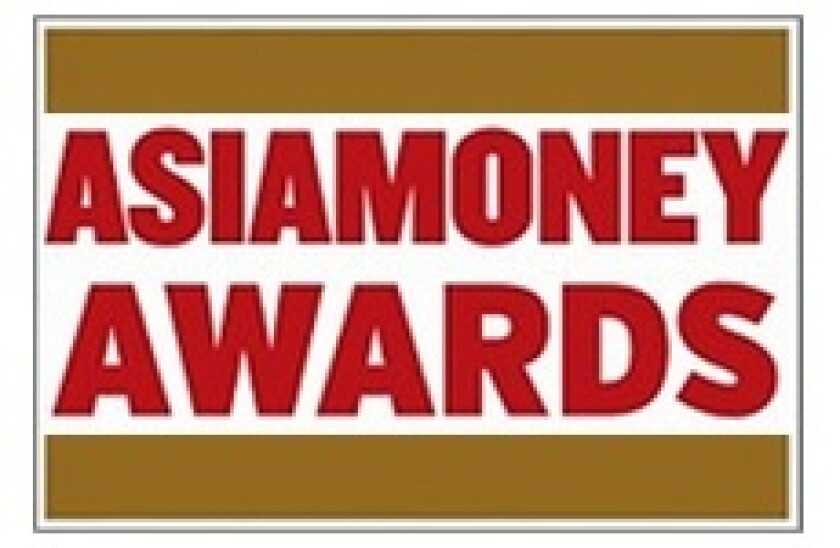Bangladesh
Banglalink’s $300m five year non call three 2019 senior bond
Sole bookrunner: Citi
More than a year in the making, Banglalink’s debut bond broke new ground for Asia’s capital markets in April. The trade was and remains the first international bond from Bangladesh, coming ahead of the sovereign, which is yet to issue.
As such, the deal provided a unique set of challenges for sole bookrunner Citi. The bank worked closely with regulators in Bangladesh to set up a framework for international corporate bond issues, which meant overcoming the country’s notoriously slow bureaucracy.
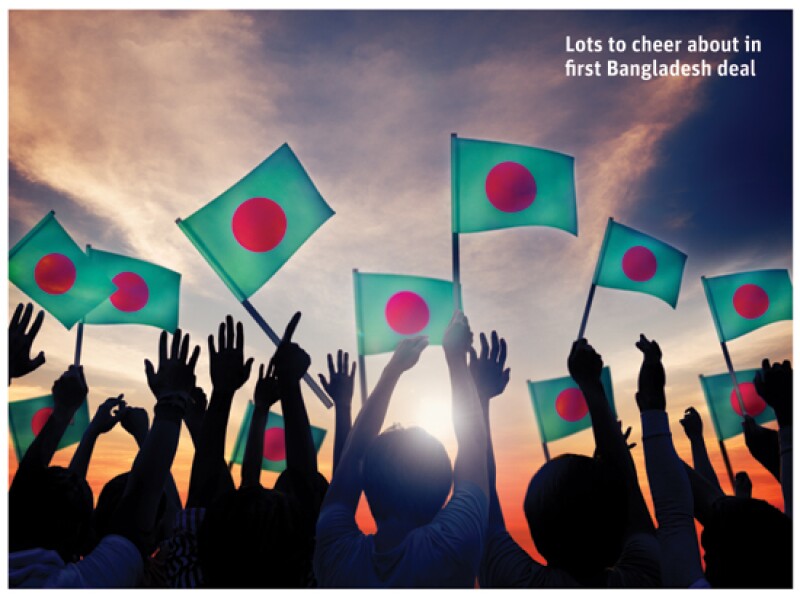
Not that the problems ended there. Pricing the first corporate bond from a frontier country without the aid of a government benchmark was never going to be easy. And the lead also had to navigate the market volatility caused by the escalating tensions between Russia and Ukraine, and a downgrade of the Russian sovereign on the day of pricing. This is because Banglalink is 99.99% owned by Global Telecom Holding, which is 51.9% owned by Russia’s VimpelCom.
While the Vimpelcom connection added to the complexity, the fact that the parent was a well known bond issuer also helped investors get comfortable with Banglalink’s credit. Also working in Banglalink’s favour was the fact that Bangladesh is a fast growing country — and telecommunications is seen as an industry with lots of growth potential.
Banglalink wasn't taking any chances, though. Ahead of the bond it met 70 investors in a roadshow covering Asia, Europe and the US, which resulted in early indications of interest of more than $600m.
And the hard work paid off. Banglalink priced a $300m 8.625% bond that attracted orders from Europe and the US as well as Asia.
China
Alibaba Group Holding's $25bn IPO
Joint bookrunners: Citi, Credit Suisse, Deutsche Bank, Goldman Sachs, JP Morgan and Morgan Stanley
Bankers proud of their deals have a tendency to hail every achievement as a landmark of one sort of another, but rarely do transactions stand out as so utterly dominant in their asset class as the IPO of Chinese e-commerce company Alibaba in September 2014.
In any other year the company's own bond — an $8bn monster in November that was the biggest Asian corporate bond — as well as the $6.5bn Bank of China additional tier one transaction in October would have been formidable candidates for this award. But we felt the $25bn IPO, the largest in history, was the clear winner.
The trade not only saw vigorous debate in its planning stages — would Hong Kong alter its prohibition on dual class share structures in order to allow the company to list there? — but also unquestionably set a new benchmark when it finally floated in New York.
Size of this magnitude can, with the benefit of hindsight, make the success of a deal sometimes feel inevitable. But this was no walk in the park. Bookrunners Citi, Credit Suisse, Deutsche Bank, Goldman Sachs, JP Morgan and Morgan Stanley had to shepherd a vast array of investors through the process, and the final order book of some $200bn well illustrated not only the appeal of the company's story but also the scale of the co-ordination task that was required.
It helped that Jack Ma, founder and executive chairman of Alibaba, was a passionate and well-known figure. He was key to drumming up support in investor meetings — and that support came on an unprecedented scale. For bankers involved in the deal, the allocation process was a marathon, but it was nonetheless well conducted, a welcome change from the backbiting that can characterise big deals with many leads.
It may come as some surprise that, given the momentum behind the deal and the extraordinary level of demand, the biggest headache was probably pricing. The IPO priced at the top of revised guidance of $66-$68, but it could have priced well above that without much trouble. But avoiding a Facebook-style drop on debut was essential, and pricing remained conservative. Avoiding the temptation to squeeze the market was exactly the right approach.
Hong Kong
The Government of the Hong Kong Special Administrative Region of the People’s Republic of China’s $1bn sukuk due 2019
Joint bookrunners: CIMB, HSBC, National Bank of Abu Dhabi, Standard Chartered
Some deals are impressive for getting a borrower out of a hole. Others are notable for their record size. Hong Kong's $1bn sukuk was no minnow, but nor was it essential funding. What it did do, and handsomely, was fulfil precisely the borrower's objectives of promoting the development of a sukuk market in Hong Kong, laying down a highly symbolic marker — and clocking up a couple of firsts, to boot.

The deal was the first sukuk from a non-Islamic sovereign, as well as the first dollar sukuk from a Triple A rated government. That in itself meant it was guaranteed plenty of attention, which was only driven further by the fact that it marked Hong Kong's first international issuance for a decade.
Standard Chartered, which was a bookrunner alongside CIMB, HSBC and National Bank of Abu Dhabi, had been working with the government for almost a year on structuring the deal, including identifying the assets that would underlie the Ijarah structure. Banks were mandated in June, but Ramadan meant that the trade did not appear until September 2014. A four day roadshow preceded pricing, and books hit $4.7bn on the day of the deal — in spite of it coming after a busy period for sovereign issuance.
The focus was on getting a landmark success away, but that did not mean the borrower sacrificed any pricing discipline. Its final pricing of 23bp over five year Treasuries was the tightest ever spread on a benchmark dollar deal from an Asian sovereign. And the new format certainly appealed beyond the region, with more than a third sold into the Middle East.
It will doubtless take some time for other Hong Kong names to follow the government's lead, but when they do they will benefit from the pioneering work done for the sovereign trade, both in terms of setting a pricing benchmark and establishing a regulatory framework for the asset class.
India
Bharti Airtel International’s $1bn 2024 and €750m ($888m) 2021 dual tranche senior bond
Joint bookrunners: Bank of America Merrill Lynch, Barclays, BNP Paribas, HSBC, JP Morgan, Standard Chartered
Since making its debut in 2013, Bharti Airtel has emerged as one of the savviest borrowers in Asia’s bond market in what is a short period of time. And its dual tranche bond from May 2014 demonstrated the issuer’s opportunistic and strategic approach to funding.
Last year was always expected to be a positive one for Indian borrowers, especially as in the run-up to an election in May it looked increasingly likely that pro-reform candidate Narendra Modi would be elected prime minister. Yet while most borrowers waited on the sidelines until the official result, on the day that exit polls showed Modi’s Bharatiya Janata Party (BJP) as the probable winner, Bharti launched a Reg S/144A dual tranche bond.
Books opened for the dollar portion in the Asia morning, with the euro note launching at the start of business in London. Both deals attracted huge order books, allowing the leads to price the dollar deal flat to the borrower’s existing curve while the euro priced through where the dollars came. It also extended Bharti’s curve in euros, with the company having made its debut in the currency just six months earlier.
Four days after Bharti priced its bond, Modi was officially proclaimed India’s new prime minister, unleashing a raft of issuance from Indian corporates for the rest of the year.
Bharti’s deal was a landmark in many ways. It ranks as the issuer’s biggest bond deal to date, but also set a benchmark for Indian credits as the largest international bond by an Indian corporate and the first dual currency dollar/euro issuance by an Indian borrower.
Indonesia
CT Corp’s $1.275bn three tranche term loan
Mandated lead arrangers: ANZ, BNP Paribas, Bank of America Merrill Lynch, Bank of Tokyo-Mitsubishi UFJ, Credit Suisse, DBS, Deutsche Bank, Goldman Sachs, ING, Maybank, RBS, Standard Chartered and Sumitomo Mitsui Banking Corp
CT Corp has certainly provided plenty of business for the region’s lenders in recent years. Having raised a $750m three year loan in 2013 to increase its shareholding in Carrefour Indonesia from 40% to 100%, the conglomerate then returned one year later for a major leveraged recapitalisation.
The $1.275bn loan encompassed three separate facilities and not only refinanced the outstanding $750m but also earlier loans of $276m and $150m.
There were plenty of challenges to overcome with the financing. The facility had different subsidiaries borrowing each tranche, because CT Corp wanted each unit to be creditworthy on a standalone basis. Trans Retail (TR) raised a $275m three year, Trans Retail Indonesia (TRI) a $500m five year and Trans Media Corpora (TM) a $500m five year.
Adding to the complexities was the fact that TR is a holding company while TRI and TM are operating companies. This meant that lenders, which were ask to participate pro rata across all three tranches or in any combination of two tranches, had to get to grips with the separate credits, including different levels of structural subordination and various amounts of leverage.
But thanks to the work of the leads, the financing went off without a hitch. The 13 mandated lead arrangers and bookrunners underwrote the transaction, obtaining the credit and underwriting approvals in under eight weeks.
And they managed to co-ordinate the sell-down for the three facilities in just another seven weeks, with the general syndication attracting 19 banks from Europe and North and South America as well as Asia.
Laos
EDL Generation Public Company's Bt6.5bn triple tranche bond
Financial adviser: Twin Pine Consulting
Bookrunners: Bank of Ayudhya, Standard Chartered, TMB Bank
As with Banglalink's bond in Bangladesh (see above), the unusual deal in 2014 from Laotian power company EDL Generation is one of a number of transactions during the year that have been so notable for their rarity that we have expanded the countries covered in our Country Deal Awards. EDL Gen's Bt6.5bn ($197m) triple tranche bond was the first from a Mekong corporate in the currency, and is likely to set the scene for more activity in future.
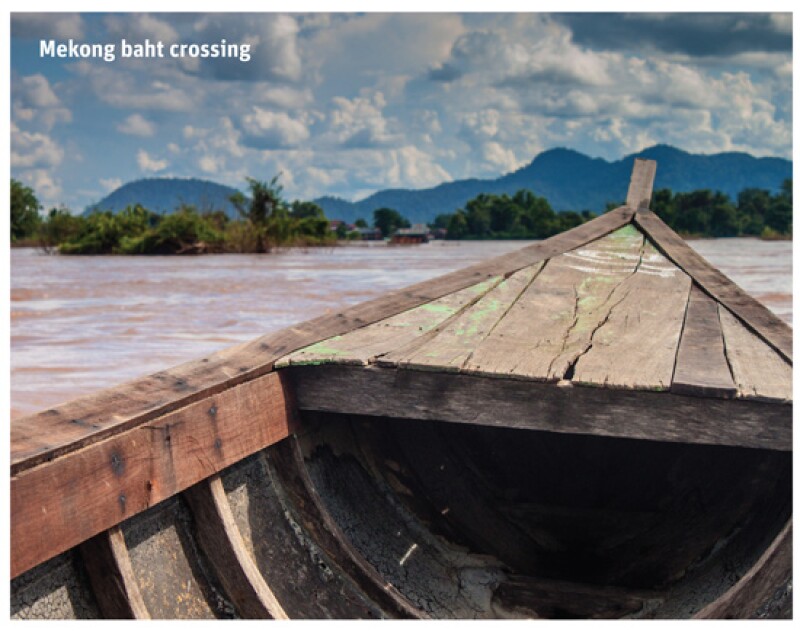
Twin Pine Consulting, financial adviser on the deal as well as also advising on previous Thai baht bond issues by the Laotian Ministry of Finance in 2013, played a vital role in preparing the way for EDL Gen's deal. That the deals were able to take place at all was down to an earlier regulatory change that saw Thai authorities give the green light not only for sales of unrated bonds, but also for its requirement that all international issuers in the local market be investment grade.
For EDL Gen, the ability to tap an offshore market was essential as its domestic market would not have supported such a deal. The December transaction, which comprised five year, seven year and 10 year tranches priced at 4.95%, 5.20% and 5.45%, respectively, was its first ever bond.
Bookrunners Bank of Ayudhya, Standard Chartered and TMB Bank gathered a book of some Bt12bn, after which the 10 year was fixed at Bt3bn, the seven at Bt2bn and the five at Bt1.5bn. The deal was bigger than both previous government issues, which had been for Bt5.1bn in October 2014 and Bt3bn in December 2013.
Malaysia
7-Eleven Malaysia Holdings' MR834m IPO
Bookrunners: CIMB, CLSA, Inter-Pacific Securities, Kenanga Investment Bank, Maybank, UBS
When it finally arrived, the IPO of 7-Eleven Malaysia Holdings was everything that market participants hoped it would be. But it was made to wait. The convenience store chain saw its initial application to list on Bursa Malaysia rejected in November 2013, before refiling its documentation in January with a lower valuation and more information.
The company was being spun off by owner tycoon Vincent Tan from the company's parent, Berjaya Retail. Cornerstone investors were always going to be a big factor in the deal, and sure enough when books opened in May, some 305m shares, representing almost 60% of the total on offer, had already been allocated to eight cornerstones.
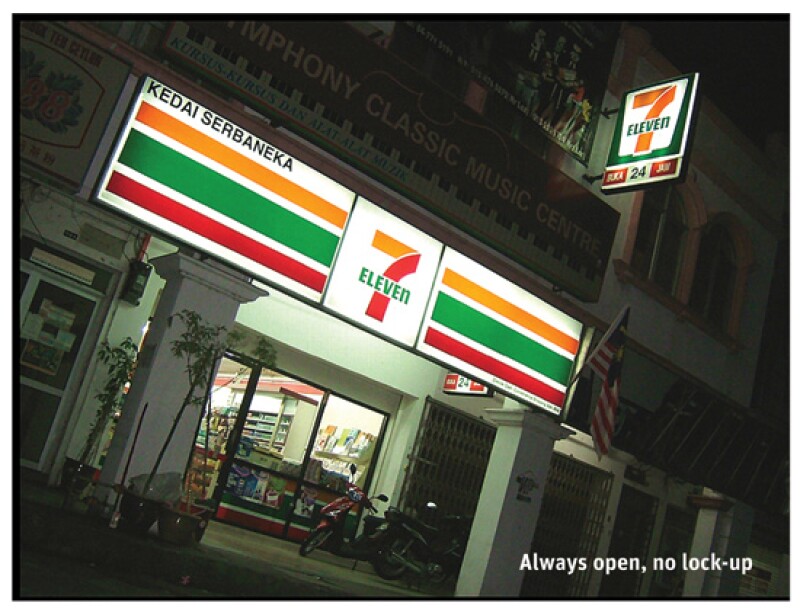
Unlike the situation seen in some Asian equity deals, notably for Chinese companies listing in Hong Kong, these cornerstones were all asset managers rather than corporates, with their interest doubtless helped by the fact that none were to be subject to a lock-up — a first for a Malaysian deal.
Their presence, and the amount of stock they had signed up for, was certainly no deterrent to others. The institutional book excluding the cornerstones was more than 10 times covered at final pricing at the top of the (very tight) MR1.33-MR1.38 price range, with some 150 names placing orders, while the retail tranche was almost five times subscribed. That so much additional institutional demand was generated was testament to the hard work put in by the leads in arranging investor meetings. Proceeds were MR834m ($232m).
Aftermarket performance was solid, with the stock closing its first day up 10.9%. But the deal's significance is more down to its precedent-setting use of cornerstones with no lock-up — a factor that the leads point to as contributing to the better than usual first-day liquidity, which totalled 16% of the free float. The fact that it was the largest retail sector IPO ever in Malaysia added to the appeal.
Pakistan
Ministry of Finance of Pakistan's $172.5m loan
MLABs: Credit Suisse, Standard Chartered, United Bank
Pakistan had not featured in the syndicated loan market for 15 years when it returned with a 360 day deal that was launched in late 2013 at $100m and closed in January 2014 at $172.5m after a successful syndication.
The deal, through mandated lead arrangers and bookrunners Credit Suisse, Standard Chartered and United Bank, was notable for indicating the continued eagerness of Middle East banks to support such deals, paving the way for a sharp return visit by the sovereign for a further loan just weeks later.
And although none of the six lenders joining the deal in syndication was from Asia, the deal offered an important opportunity to get the credit discussed among lenders in the region. Taiwanese banks in particular had shown an interest.
As well as being a rarity for the country, Pakistan's January deal was also the first syndicated loan for an Asian sovereign since Sri Lanka wrapped up a $170m three year facility in 2008.
Pakistan is rated B- by Standard & Poor's and Caa1 by Moody's. The loan priced at a margin of 400bp over dollar Libor, with fees of 30bp-70bp taking all-ins to 430bp-470bp.
Such was the interest in the first deal that an 18 month follow-up deal was able to come in February after reverse enquiry. It wrapped up in March, with Credit Suisse and United Bank again leading. That deal carried a margin of 450bp.
The sovereign returned to the bond markets later in the year, bringing a dollar deal in April and only its second ever dollar sukuk in November.
Philippines
The Republic of the Philippines' switch tender and $1.5bn bond
Bookrunners: ANZ, Citi, Deutsche Bank, Goldman Sachs, HSBC, JP Morgan, Morgan Stanley, Standard Chartered
When the Philippines opted in January 2014 to try to switch investors into a new $1.5bn 10 year bond and out of some much more costly debt spread across six separate issues, it not only succeeding in exchanging some $1bn of old bonds but also gathered no less than $10bn of new money demand from 500 accounts, repricing its curve in the process.
The deal's roster of achievements was extraordinary. Launching with guidance of 4.5% area, before pricing to yield 4.2%, bookrunners ANZ, Citi, Deutsche Bank, Goldman Sachs, HSBC, JP Morgan, Morgan Stanley and Standard Chartered ended up delivering a deal with a negative new issue premium. It traded up by a point on the break, while the rest of the dollar curve tightened by half a point.
The deal was executed as an accelerated switch tender, fairly familiar with European and US investors but a little more unusual for Asia. The entire deal was completed within 24 hours.
There was strong demand for the credit, but momentum was also driven by the fact that some of the bonds being taken out were of a similar maturity to the new issue. Bonds were exchanged from the sovereign's 8.875% due 2015s, 8% and 8.75% 2016s, 6.5% 2020s, and 7.5% and 9.5% 2024s.
The exercise was followed by a similar process at the other end of the year, in December, when the sovereign switched investors out of six old issues and into a new $2bn 25 year bond that priced at 3.95% after getting $13.5bn of orders. That followed a one-notch upgrade by Moody's to Baa2 that was a testament to the borrower's debt reduction and fiscal management improvements.
Singapore
Goodpack’s $720m 2021 and 2022 term loan B
Sponsor: KKR
Mandated lead arrangers: Credit Suisse, DBS, Goldman Sachs, KKR, Macquarie Bank, Mizuho Bank, Morgan Stanley, Natixis
KKR’s leveraged buyout of intermediate bulk container company Goodpack pushed the boundaries of what Asian companies can achieve in the US market.
Heading to America is not usually the first choice for the region’s borrowers. Asian companies using the term loan B market remain rare and they have been met with mixed success. But for Goodpack it proved to be the perfect option.
One reason it suited the company is because it has a global business with a large chunk of its revenues coming from the US, even though it is headquartered in Singapore. In addition, because the take-private was done by way of a scheme of arrangement, the leads had to contend with a fixed timeline for getting the funding arranged.
The term loan B market also offered plenty of advantages. It allowed for the seven and eight year loans to be structured as bullets with just 1% amortisation, both conditions that Asian investors do not feel comfortable with.
The move paid off, with the $550m first lien term loan and the $170m second lien term loan more than three times subscribed, allowing the leads to price the transactions at below guidance and wiping out any Asia premium.
And while the majority went to US investors, a portion was also distributed to select Asian lenders.
The cutting edge nature of the transaction is underlined by the number of milestones it racked up. Goodpack became the first Asia ex-Australia company to tap the US term loan B market, while the loan was the largest LBO financing in southeast Asia since the global financial crisis. As such, it acts as a template for future fundraising by Asian companies in the US term loan B market.
South Korea
Samsung SDS's W1,158bn IPO
Bookrunners: Goldman Sachs, JP Morgan, Korea Investment & Securities
The top-notch name recognition of the Samsung brand was always expected to set South Korean ECM alight when a long awaited cluster of deals related to the group's reorganisation finally got going. Sure enough, the first of those transactions — the W1,158bn ($1.1bn) IPO of Samsung SDS, the group's technology logistics subsidiary — did not disappoint, pricing at the top of guidance amid blistering demand.
The deal was the biggest IT services IPO globally in the last 10 years, and according to the bookrunners was the most institutionally oversubscribed IPO in Korea since 2010. In the context of Korean ECM in 2014 it was not hard for the deal to stand out — business had until then been fairly low, with less than $1bn of IPO volumes for the year to date.
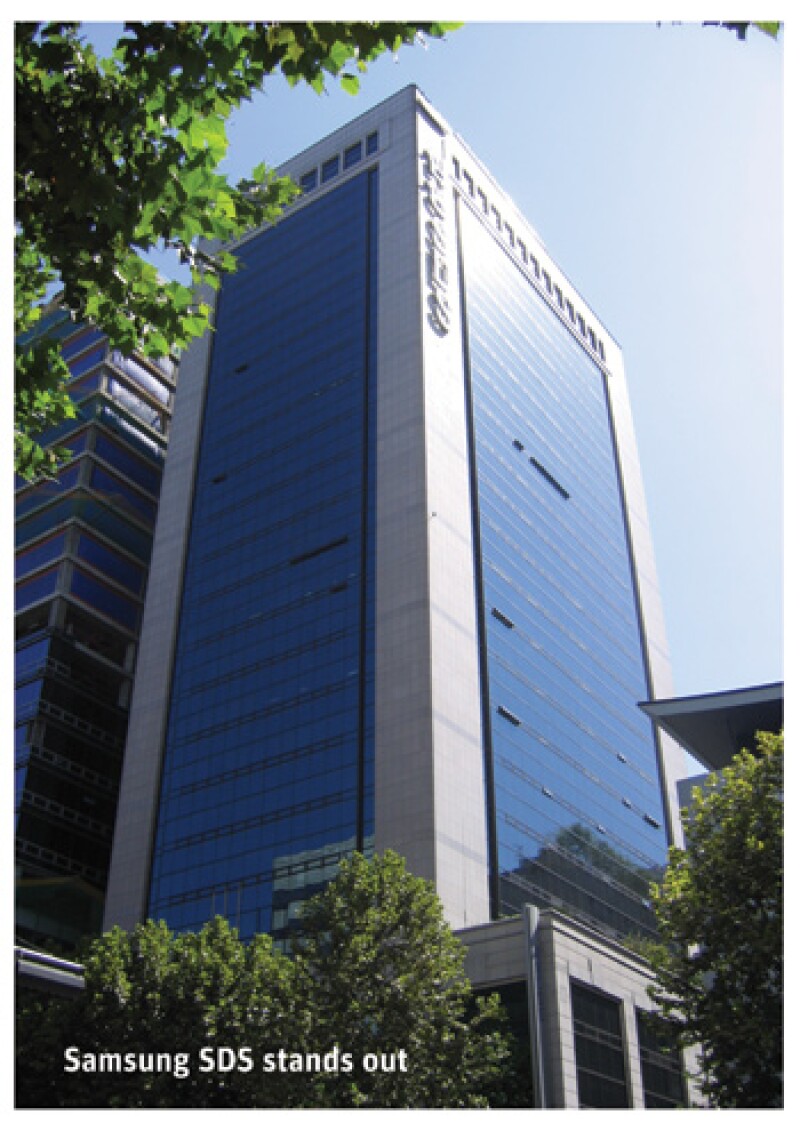
But the transaction did more than just provide a uptick in deal flow — it positively roared, and set the scene for the subsequent flotation of Cheil Industries, previously called Samsung Everland and the de facto holding company for the group.
The SDS deal followed the announcement in April of a reorganisation of the Samsung conglomerate in a move that is seen in part for preparing the way for a new generation to assume control of the business from chairman Lee Kun-hee, who has been suffering from ill health.
But while important for the Samsung business, the SDS IPO was also being widely viewed as a crucial test case for broader South Korea ECM activity. A lot would be riding on its success or failure.
The result was a triumph. The deal priced at W190,000, the top of a price range that started at W150,000, with the final pricing representing a premium to the company's regional and global peers. Some 160 accounts were in the institutional book, and bookrunners Goldman Sachs, JP Morgan and Korea Investment & Securities had to zero some investors.
And aftermarket performance was startling, with the stock soaring 70% on day one in spite of the premium valuation. At the time of writing it was at about 35% up from its IPO price.
Sri Lanka
The Democratic Socialist Republic of Sri Lanka's $1bn bond
Bookrunners: Citi, HSBC, Standard Chartered, UBS
In what turned out to be a busy year for sovereign issuance in 2014, it was Sri Lanka that started the ball rolling with a $1bn five year deal in the very first week of the year. The dollar print was the country's first in the currency for two years and not only captured the imagination of investors but also perfectly set up the sovereign's return to the market a few months later.
When Sri Lanka came to market on Monday January 6, it found itself competing with issues from popular corporates from the region, like Guangzhou R&F Properties and — remarkably, given events since then — Kaisa Group. But such was the breadth of demand for the credit that the sovereign had little need to rely on Asian buyers.

With leads Citi, HSBC, Standard Chartered and UBS having announced guidance of 6.25% in the morning Hong Kong time, big orders began to come in when investors from the Middle East and Europe started to look at the deal. Important US investors were then engaged before the deal was launched there, guidance was tightened to 6%-6.125% and the deal printed at 6% early on Tuesday morning.
The timing was spot-on, with the borrower still getting in ahead of sovereign peers in the region in spite of being convinced by its advisers to hold back from issuing ahead of the weekend. And by providing the first such credit for investors to get their teeth into in 2014, Sri Lanka was also able to lap up more than $3bn of demand from 200 accounts, with almost two thirds going to the US, where the credit has always been followed well.
Rarity value helped, since the borrower had not been to market in two years, a fact that helped it secure pricing that came through its existing curve. Its good performance neatly opened the way for its subsequent $500m five year in April, which was nine times covered.
Taiwan
Advanced Semiconductor Engineering's $300m green bond
Bookrunners: Citi, DBS, HSBC
Advanced Semiconductor Engineering made a splash with its debut dollar note in July 2014 by becoming the first Asian corporate to issue a green bond — an honour that it still holds more than six months later.
Although green bonds have been incredibly slow to take off in Asia, and also require extra work in terms of getting the correct accreditation, the borrower was committed to getting the right environmental credentials for the trade as it transitions to low carbon growth.
To make extra sure the trade would qualify as green debt, the company sought a second opinion for the use of proceeds from the Center for International Climate and Environmental Research – Oslo (Cicero).
But the lack of familiarity with green debt by Asian investors was no barrier to the deal going ahead. In fact, when it came to bookbuilding the leads emphasised ASE’s rarity as the first Taiwanese name to issue in dollars in 2014, rather than the bond’s environmental credentials.
The strategy was the correct one, with investors pouring into the trade. The order book surpassed $800m after just two hours and finally closed at $2bn, or more than six times subscribed. The strong investor demand meant the leads were able to price the deal 25bp through initial price guidance, locking in a final spread over Treasuries of 125bp to come inside where ASE’s comparables were trading.
ASE’s bond showed it was possible for Asian companies to meet environmental goals while achieving cost effective funding. And as such it acts as a template for green bond issuance in the region and is a worthy winner of the Taiwan award.
Thailand
Indorama Ventures Public Company's Bt15bn hybrid bond
Bookrunners: Bangkok Bank, Krung Thai Bank, Siam Commercial Bank
Indorama Ventures Public Company Limited (IVL), one of the leading polyester chain and wool yarn producers in the world, was looking last year to extend the average maturity of its debt profile. As of September, that stood at less than eight years and its longest ever issuance had been 12 years.
The plan it worked on with its banks was a radical one — a rare Thai baht perpetual hybrid. And at the end of October, it printed a Bt15bn ($460m) deal.
Through the deeply subordinated hybrid structure, the borrower was also looking to diversify its capital base. The deal was callable after five years and the issuer had the right to unconditional interest deferral. Until the end of year five, the coupon was 7%, before switching to a spread over five year Thai government bonds of 4.33% until year 26, 5.08% until year 50 and 7.08% thereafter.
The issue carried a rating of A- from TRIS Rating, which rates the borrower A+. The bonds received 50% equity credit from TRIS and from S&P, and 100% equity accounting treatment. The coupon was 100% tax deductible.
Investors flocked to the issue, with some 47 institutions placing orders alongside 4,241 individuals. Retail received 43% of the allocation. In the first two months after issue, trading volume in the bond (all at par) was Bt32.5bn. The deal had fulfilled all the requirements of the issuer — securing equity treatment, a tax deductible coupon and flexibility on repricing in the future. And its innovative nature ensured it was a standout winner of this award.
Vietnam
The Socialist Republic of Vietnam's switch tender and $1bn bond
Bookrunners: Deutsche Bank, HSBC, Standard Chartered
Sovereign deals were all the rage in Asia in 2014, but few were more striking than Vietnam's transaction in November, its first appearance in the international debt market for four years. In completing the deal alongside an accelerated switch tender, it borrowed a structure used by the Philippines at the start of the year (see above), but the result was nothing short of a blowout.
The borrower had a $750m bond maturing at the start of 2016, and so was expected to be coming to market before then. And it had held some investor meetings in 2013, although there was no deal forthcoming.

When it finally did come in 2014, its timing could hardly have been better. It was able to ride the momentum provided by two credit rating upgrades — to B1 by Moody's in July and to BB- by Fitch at the start of November — that had come as a result of an improving macro picture. Given the cheaper funding that Vietnam could now achieve, it was fortunate not to have pushed ahead in 2013.
Guidance for a new 10 year bond opened at 5.125% area, before being tightened by 30bp. Bookrunners Deutsche Bank, HSBC and Standard Chartered were flooded with demand, as $10.6bn of orders were placed by 450 accounts.
The final print yielded 4.8%, a handsome tightening from the 6.875% Vietnam was paying on its 2016s and the 6.75% on its 2020s, the two issues that it was offering to switch investors out of. In the event it accepted all $436m that was tendered for the 2016s and half of the $580m tendered for the $1bn 2020s.
Vietnam had originally planned for a 50/50 exchange/new money split, but the exceptional interest shown in the trade by existing holders made flexibility the more sensible approach. In any case, it would have been a headache to seek approval for more than $1bn, but when it does return, the sovereign looks set for a barnstorming response.

